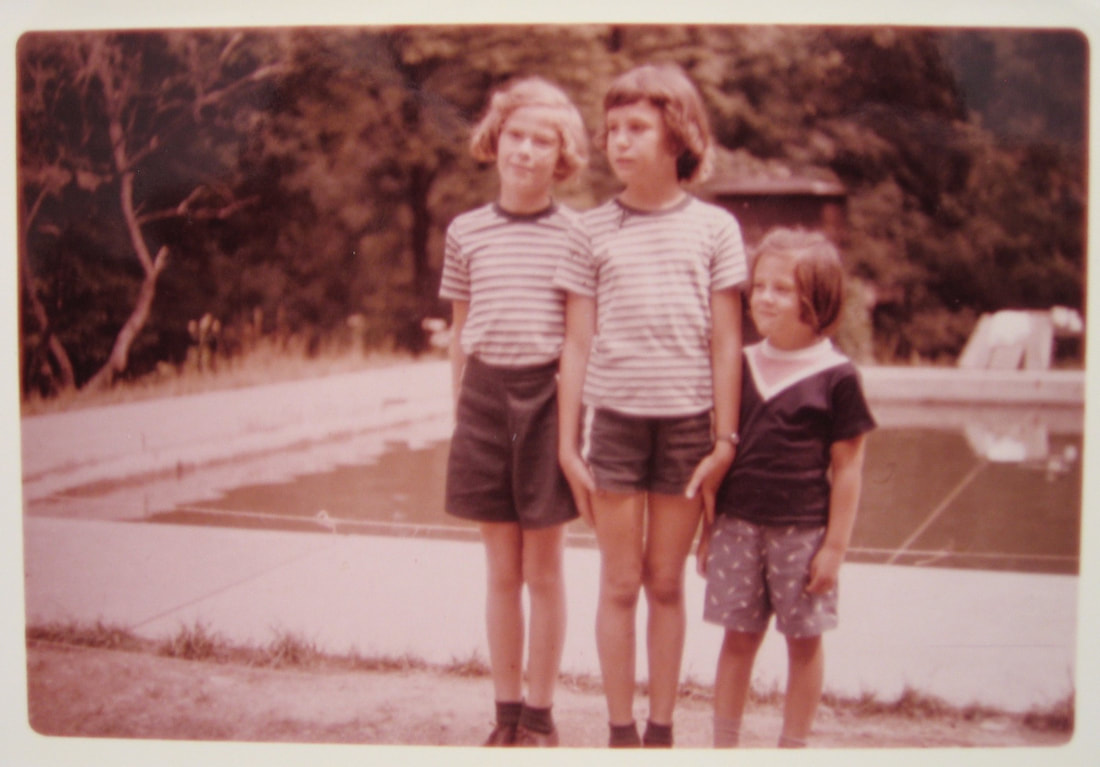|
For about four weeks in fourth grade, I refused to go to school. My mom took me to a child psychologist, who gave me a bunch of puzzles (diagnostic tests?) that were a lot more fun than getting teased at Suncrest Elementary. One of my favorites was receiving four cards with related pictures and arranging them in order to tell a story.
Healthy minds were probably supposed to identify the one correct sequence to produce a logical narrative. The fun was that other orders were possible, too, and made for different stories. We humans appear wired for story. We shuffle the cards of our days to create one tale after another. Our dreams generate a narrative from a random set of memories or images. I never learned what the psychologist concluded. Eventually I mustered my nerve and went back to school. All these decades later, I still delight in rearranging elements to create unexpected stories. That’s me on the left, at Girl Scout camp.
13 Comments
Henry David Thoreau* wrote, “I went to the woods because I wished to live deliberately, to front only the essential facts of life . . . I wanted to live deep and suck out all the marrow of life . . .”
On the way home from an oil change last week, car maintenance being an essential fact of my life, I stopped on impulse to explore an unfamiliar footpath. Parts of it were well-worn tracks, other parts nearly hidden by undergrowth. Maples, yellow coneflowers, sudden descent into a ravine. For John Garvens, living deliberately means pursuing your passions strategically. For Sarah Chauncey, it involves quieting the mind and letting matters unfold. For Nicole Wolfe, it’s a matter of focus and engagement. Merriam-Webster defines deliberate in terms of careful consideration, awareness of consequences, and steadiness or lack of hurry. Awareness and choice are the warp and woof of living deep. Following my curiosity about a woodland path led to a chosen, unhurried half hour of awareness. Every such half hour sucks at the marrow of life. *Factoid: His friends pronounced Thoreau with the accent on the first syllable, according to Ralph Waldo Emerson’s son. Pressing for Medicare legislation, President Johnson told press secretary Bill Moyers, “We’ve just got to say that, by God, you can’t treat grandma this way. She’s entitled and we promised it to her.”
Words are like people; they change and grow. Entitle is a prime example. At core, an entitlement is the grant of a rightful legal or moral claim, like the title to your house or car. The first sentence of the Declaration of Independence refers to “the separate and equal station to which the Laws of Nature and of Nature's God entitle them.” The shift in usage, from rightful to unjustified, dates from the 1960s and 1970s. Psychologists described narcissists as displaying a sense of entitlement. Politicians dropped the word “earned” from Roosevelt’s description of Social Security as an earned entitlement. Defenders of Medicare and Social Security say the programs aren’t entitlements; we’ve paid into them and earned them. Oddly, it has become an insult to call something an entitlement if the recipient is actually entitled to it. When earnest, scholarly William falls in love with lighthearted jokester Jerome on Chicago’s South Side, William’s family discourages the relationship. Jerome’s friends complain the two have nothing in common except being gay black men. William’s death in a traffic stop pushes Jerome into a seriousness of purpose unlike any in his free-spirited past.
Would your interest in reading this book change if you knew the author was white? Straight? A woman? From Vermont? Is it fair to evaluate a book on the basis of who wrote it? With growing demand for novels with minority protagonists, is it offensive for authors outside a given culture to jump on the bandwagon? Such issues generate heat in some circles. I’ll jump into the fray. All novelists write about characters different from themselves; otherwise it’s a memoir. I can never be the wife of a medieval merchant. The farther I’m removed from a character’s culture, the more research and empathy it takes to avoid out-and-out errors and stereotyped, one-dimensional characters. It can be done. The Navajo Nation honored non-Native mystery author Tony Hillerman with its “Special Friends of the Dineh Award” in 1987. Click here for his obituary in the Navajo Times. An author’s background may help me predict the credibility of a work, but the best test is how the novel comes across to people in the culture it portrays. |
AuthorI'm a historian who writes novels and literary nonfiction. My home base is Madison, Wisconsin. Archives
July 2024
|

 RSS Feed
RSS Feed